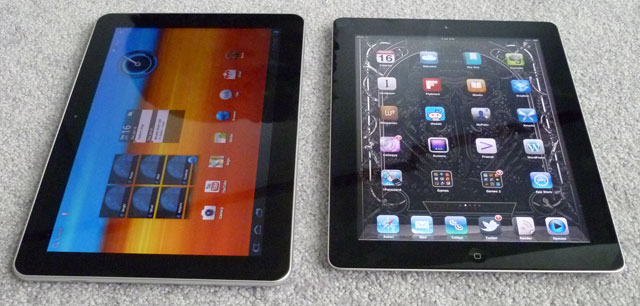
Apple has had one win and one setback this week in its patent battle against Android. The International Trade Commission denied Apple's attempt to obtain an emergency ban on the import of a number of HTC smartphones running Android, while a US District Court has upheld an injunction against the sale of Samsung's Galaxy Tab 10.1.
HTC's One X and EVO 4G LTE handsets were originally delayed from their May 18 launch date while US Customs officials examined the devices for compliance with a previous import ban—the result of an ITC complaint initiated by Apple. Apple later tried to obtain an ITC ban on 29 HTC smartphones—practically HTC's entire portfolio—but was denied this request on Tuesday, with the ITC arguing that Apple didn't do enough to prove the emergency nature of its request.
"The commission finds that Apple has not demonstrated the propriety of temporary emergency action here," wrote the ITC. "The commission will not direct Customs to detain all subject HTC products because the commission does not have the information necessary to determine whether the respondents are currently violating the commission’s limited exclusion order."
But Apple's luck this week isn't all bad. Late Monday, US District Judge Lucy Koh denied Samsung's request to reverse an injunction barring the sale of the Galaxy Tab 10.1 within the US. The preliminary injunction came down the line only a week ago, with Judge Koh ruling that the Galaxy Tab 10.1 did in fact infringe on one of Apple's design patents for the iPad. Samsung argued that it would suffer irreparable harm if the injunction wasn't stayed, but Judge Koh said that was unlikely because Samsung had acknowledged it had other tablets on the market.
Samsung is understandably disappointed with the decision, but says it plans to appeal. "Samsung is disappointed with the court's decision that denied our motion to stay. We believe today's ruling will ultimately reduce the availability of superior technological features to consumers in the United States," Samsung said in a statement. An Apple spokesperson responded to the decision by telling Reuters that "this kind of blatant copying is wrong and, as we've said many times before, we need to protect Apple's intellectual property when companies steal our ideas."
In the meantime, Samsung has acknowledged for the first time that Google is lending a hand when it comes to patent disputes with Apple. The company told The Korea Times that Samsung and Google "have been working closely to create a united front against Apple’s legal offensive," though a Samsung insider was also cited saying that a cross-licensing deal between Apple and Samsung "seems to be becoming likely."
Samsung suffered another setback last Friday thanks to Apple, with Judge Koh issuing an injunction against the company's Galaxy Nexus smartphone. That device remains available via Google's website as of this writing—at least until Apple posts the $95 million bond required in order to enact the injunction.
Meanwhile, back at the farm…
Finally, in non-Android patent news, a US bankruptcy court has ruled that Kodak can still put its patent portfolio up for auction, despite claims of ownership by Apple and FlashPoint. Kodak had accused Apple in June of attempting "delay and derail" the patent sale by abusing its financial position over Kodak, but issued a statement this week saying the auction would still take place in August.
"The Apple and FlashPoint claims are baseless and Kodak will still seek dismissal on summary judgment in July," Kodak's Chief Intellectual Property Officer Timothy Lynch told the AFP. "Today's ruling provides a court-approved process allowing buyers to acquire the patents free and clear of all ownership allegations, regardless of the status of the dispute with Apple and FlashPoint at the time of closing."
reader comments
88